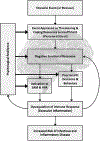Resilience and immunity
- PMID: 30102966
- PMCID: PMC6545920
- DOI: 10.1016/j.bbi.2018.08.010
Resilience and immunity
Abstract
Resilience is the process that allows individuals to adapt to adverse conditions and recover from them. This process is favored by individual qualities that have been amply studied in the field of stress such as personal control, positive affect, optimism, and social support. Biopsychosocial studies on the individual qualities that promote resilience show that these factors help protect against the deleterious influences of stressors on physiology in general and immunity in particular. The reverse is also true as there is evidence that immune processes influence resilience. Most of the data supporting this relationship comes from animal studies on individual differences in the ability to resist situations of chronic stress. These data build on the knowledge that has accumulated on the influence of immune factors on brain and behavior in both animal and human studies. In general, resilient individuals have a different immunophenotype from that of stress susceptible individuals. It is possible to render susceptible individuals resilient and vice versa by changing their inflammatory phenotype. The adaptive immune phenotype also influences the ability to recover from inflammation-induced symptoms. The modulation of these bidirectional relationships between resilience and immunity by the gut microbiota opens the possibility to influence them by probiotics and prebiotics. However, more focused studies on the reciprocal relationship between resilience and immunity will be necessary before this can be put into practice.
Keywords: CD8 T cells; Cytokines; Depression; Gut microbiota; Gut-brain axis; Immunity; Indoleamine 2,3 dixoygenase; Inflammation; Optimism; Personal control; Positive affect; Psychobiotics; Recovery; Resilience; Social support; Stress.
Published by Elsevier Inc.
Figures




References
-
- Adler N, Matthews K, 1994. Health psychology: why do some people get sick and some stay well? Annu. Rev. Psychol 45, 229–259. - PubMed
-
- Anisman H, 2015. Stress and Your Health: From Vulnerability to Resilience Wiley, New York.
-
- Ashby FG, Isen AM, Turken AU, 1999. A neuropsychological theory of positive affect and its influence on cognition. Psychol. Rev 106, 529–550. - PubMed
-
- Association, A.P. http://www.apa.org/helpcenter/road-resilience.aspx.
Publication types
MeSH terms
Substances
Grants and funding
LinkOut - more resources
Full Text Sources
Other Literature Sources
Research Materials

